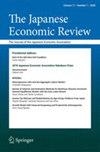包裹和捆绑商品的彩票实验:福袋经济学研究
IF 0.5
4区 经济学
Q2 ECONOMICS
引用次数: 3
摘要
福袋(Fukubukuro)在日本和其他地方都是一种常见的制度,在这种制度下,新年促销商品的确切内容在消费者购买之前是隐藏的。受福库罗例子的启发,以及缺乏关于涉及商品的彩票风险态度的证据,我们进行了一个实验室实验,其中的结果是捆绑或非捆绑的商品。垄断销售者以彩票形式销售商品而不是单独销售商品的隐含收益,只有在获得价值更高的商品的可能性更高的彩票中才明显为正。本文章由计算机程序翻译,如有差异,请以英文原文为准。
Experiments on lotteries for shrouded and bundled goods: Investigating the economics of fukubukuro
Fukubukuro (or lucky bag) is a familiar institution in Japan and elsewhere in which the exact contents of a New Year sales item are hidden from the consumer before purchase. Motivated by the fukubukuro example and the lack of evidence on risk attitudes in lotteries involving goods, we conduct a laboratory experiment in which the outcomes are bundled or unbundled goods. The implied gains to a monopoly seller for marketing goods in lottery form rather than separately are only clearly positive for lotteries where there is a higher probability of obtaining the more highly valued good.
求助全文
通过发布文献求助,成功后即可免费获取论文全文。
去求助
来源期刊

Japanese Economic Review
ECONOMICS-
CiteScore
2.70
自引率
0.00%
发文量
15
期刊介绍:
Started in 1950 by a group of leading Japanese economists under the title The Economic Studies Quarterly, the journal became the official publication of the Japanese Economic Association in 1959. As its successor, The Japanese Economic Review has become the Japanese counterpart of The American Economic Review, publishing substantial economic analysis of the highest quality across the whole field of economics from researchers both within and outside Japan. It also welcomes innovative and thought-provoking contributions with strong relevance to real economic issues, whether political, theoretical or policy-oriented.
 求助内容:
求助内容: 应助结果提醒方式:
应助结果提醒方式:


